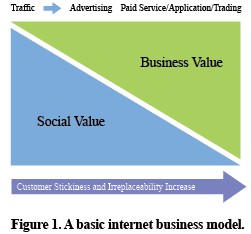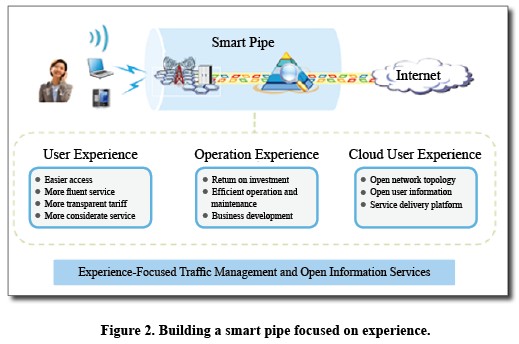User Experience Always Comes First
User Experience Is the Core of Internet Economy
In the 40 years since the emergence of internet, the number of internet users has ballooned to 2.3 billion worldwide. In recent years, this number has been increased by the rapid development of mobile internet.
The success of an internet business model is determined by user scale, user stickiness, and the influence of information. The size of the user base is of vital importance to an internet company. Research by Bain & Co. revealed that a 5% improvement in customer retention rates can yield a 75% increase in profits for companies across a wide range of industries.
It is the consensus in the internet industry that users are the core of the internet economy.
● “Users are the foundation of internet services.” —NetEase CEO William Ding
● “The essence of the internet is to promote communication between users for lower costs.” —Tencent CEO Ma Huateng
● “The essence of the internet is to share.” —Ma Yun, chairman of Alibaba
Users are vital to an internet enterprise. Many successful business models are based on developing free user groups in the infancy. The Internet has given customers a convenient way of exchanging information, abundant entertainment, diverse communication platforms, and more efficient and economical transaction channels that cannot be provided by traditional channels. The internet attracts users by providing novel, economical, convenient, and high-quality experiences. Good user experience not only enhances user dependence on products and information but also attracts new users and improves user stickiness.
For enterprises in the internet industry, business value is gained using a traffic model mainly used by telecom operators or an advertisements or services/applications model mainly used by content providers. The former merely relies on traffic and provides the most fundamental service, but the model has higher social value rather than business value and has low user stickiness. Users can choose any traffic service provider and usually regard low price as the most important criterion. That is also the main reason why operators are channelized and why their revenues do not increase along with traffic.
The second model involves creating value by providing unique, experience-focused services such as online games and electronic trading in addition to traffic service. This business model is more valuable and has more user stickiness than the first model. As the scale of traffic and users expands, the model gains in business value. This effect is especially obvious in advertisement services.

Voice service provided by telecom operators is also a kind of experience service which offers high-quality voice communication to users anytime, anywhere. However, innovation in the telecom industry is KPI-orientated. Telecom operators usually establish a standard architecture first when introducing new services. This is always a strict but long process. Once the service is launched it cannot be changed easily. The service experience is not diverse and is inflexible. But internet companies pay more attention to user experience. They flexibly introduce new, innovative products and services to meet the user’s need for new experiences. This mode has low costs and has created abundant over-the-top services.
Experience-Focused Smart Pipe Is Key to Operator Transformation
In the mobile internet era, an operator’s leading position in the value chain has declined in face of the competition from internet service providers. Building a stronger smart pipe is the best, most feasible way for operators to transform themselves. User experience is the core of the internet economy. Experience determines user loyalty and how long they stay on the network. It also influences an operator’s revenue. Therefore, operators must focus on user experience when building a smart pipe.

First, an operator must cease using resource utilization rate as a criterion for capacity expansion. They must also cease being KPI-oriented in network evaluation and construction. Sometimes good KPIs do not mean good user experience. Building a new type of network focused on user experience is key for operators to vie for users. By improving end user experience they can boost network access and traffic revenue and can grow at the same pace as internet companies.
Specific measures include:
● selecting the most suitable and economical access method according to user locations and services when expanding the pipe bandwidth
● managing traffic to accurately know a user’s service application and consumption record
● establishing differentiated operation modes, such as application awareness and hierarchical services
● establishing a service-adaption mechanism for distributing effective content and for storing and sharing popular content. This enhances the speed at which users can access an operator’s services and mobile internet applications
● setting up a user experience evaluation and management system to collect, analyze, evaluate, and improve user experience and realizing precision user marketing.
Second, operators must learn from internet enterprises and change their current operation principle merely replying on traffic. They must turn network capability and user information into value, provide open platforms for delivering service content, cooperate with internet enterprises, build a new backward business model, and offer more experience-focused services to users.
Internet applications and the market are developing continuously. Mobile internet has brought new development opportunities as well as challenges. The internet market is already witnessing fierce competition long before it has matured. Users will be the ultimate beneficiary in this competition. In the mobile internet era, operators cannot merely depend on their technical advantages to meet the challenges. Only by focusing on innovative products and business model and user experience can they compete.